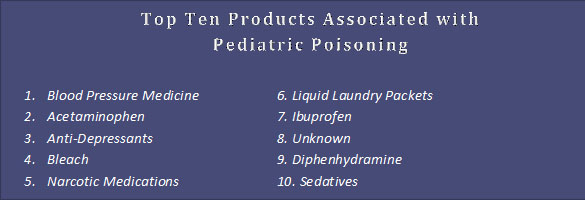March is Poison Prevention Month, and there are some recommendations that parents, family members and caregivers should know and follow to prevent childhood poisonings, especially related to medicines and household products! Unintentional injuries are a leading cause of death in young children. Common unintentional injuries are suffocation, drowning, poisoning, fire/burns, falls, and sports-related injuries and, of course, injuries caused by motor vehicles. For the purpose of this blog posting, we will concentrate on how to prevent child poisonings, especially those related to household products and medicines.
First, the U.S. Poison Control Center’s telephone number should be accessible near your landline phone and/or in your speed dials or list of emergency contacts on your cell or smart phone. The number should be easily visible to anyone including your child’s caregivers or babysitters! The number is: 1 (800) 222-1222. This phone line is open and staffed 24 hours a day, 7 days a week! If you suspect a poisoning, call the Poison Control Center, stay on the phone and follow the instructions you are given.
ALL medicines and household products (including the items you would normally keep in a medicine cabinet or medicine chest and cleaning products, laundry detergents, household chemicals of all kinds, etc.) SHOULD BE STORED UP HIGH, OUT OF SIGHT, preferably in a LOCKED CABINET. Children–even young children–are climbers, they are curious, they pull things down on their heads they can barely reach.
If you take medicine, do not place your medicine on the table, counter or night table, where a child might see it and think it is candy, reach and possibly swallow it.
If you take or give medicine to a child at night, TURN ON THE LIGHT, so you can see that you are taking or giving your child the proper dosage.
If you must do something else while you are in the process of taking medicine–like answering the phone or going to the bathroom–take your young children with you and don’t allow yourself to be distracted when medications are present. Make sure to secure child safety caps every time you open and close your medicine bottle or container. And put the medicine away after use, up high, where your child CANNOT reach it.
The U.S. Centers for Disease Control and Prevention also recommends that you learn if any guests visiting your home and bring in medicines or drugs, legal or illegal, ask guests to store their medicines where children cannot get to them. Don’t take or give larger doses of medicine to your child than are prescribed by your family physician. Follow the directions on the label, and if you have questions, call your pharmacist, your child’s primary care provider, or your doctor’s office before administering the medicine!

